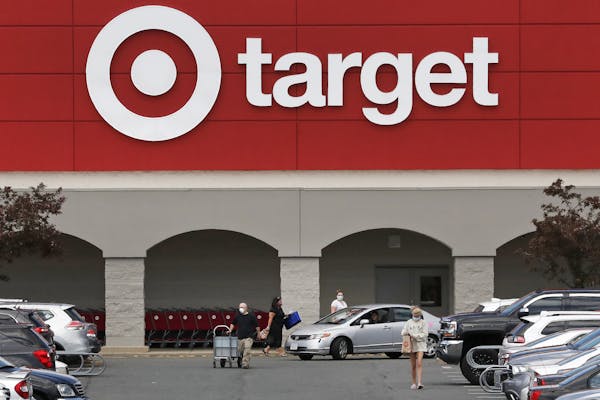Shoppers won't have to jostle each other for early-bird doorbusters at Target this holiday.
The Minneapolis-based retailer has announced it will be open only its normal hours on Black Friday, a major departure from past years. Target has already announced it would close on Thanksgiving Day.
Target and other retailers say they are trying to limit crowds this shopping season as a result of health concerns surrounding the coronavirus pandemic.
"We are taking a completely new approach to Black Friday, minimizing the event-day shopping behavior that is typical for this time of year," said Target CEO Brian Cornell, in a Wednesday afternoon call.
Starting in November, Target will offer new holiday deals in different shopping categories each week with products available online and in store. Target stores will open at 7 a.m. on Black Friday, the time the majority of stores usually open.
To help control crowds, Target employees are being directed to monitor and limit the number of people inside stores, and shoppers will be able to go to Target.com/line to check to see if there is a line outside of a store and reserve a spot.
The retailer is doubling its amount of drive-up parking by adding nearly 8,000 more spots for customers to pull up and wait for items ordered online to be delivered to their cars. Target also is equipping its employees with 1,000 more MyCheckout handheld devices so they can help check out customers in aisles, not just registers.
"There's no need to shop in a crowded concentrated time frame," Cornell said.
Besides Target, Richfield-based Best Buy, Walmart and Kohl's are among retailers that will be closed on Thanksgiving. Walmart stores will open Black Friday at 5 a.m., a couple of hours earlier than stores usually do. It will spread out deals over three events. Last week, Best Buy ran some of its Black Friday sales at the same time Amazon held its Prime Day two-day event and Target launched its Deal Days online sales.
Early sales aren't anything new. Black Friday creep — the sales phenomenon in which retailers launch their Black Friday deals on Thanksgiving Day and even earlier — has seeped into the holiday shopping experience for the past few years.
But even with the earlier and more spaced-out sales season, consumers are still expected to spend less than usual because of the COVID-19 pandemic and the real and perceived economic concerns, said Matt Marsh, managing partner for the Minneapolis office of accounting and consulting firm Deloitte.
"Retailers like to spread out the holiday season and elongate it because there's evidence that the consumer will spend more," he said. "You are still dealing with a very conservative shopper. You are dealing with that level of uncertainty that exists."
Shoppers in the Twin Cities are expected to spend $995 per household this holiday, down 28% from last year and down just as much compared with the national average of $1,387, according to Deloitte's annual holiday survey.
Consumers are shifting their spending that might have earlier gone to interests like traveling to things they can do closer to home and entertaining with big spending on food and drink, Marsh said.
In the survey, half of holiday shoppers said they feel anxious about shopping in stores, saying they expect to spend the majority of their holiday budget online. Three out of four shoppers plan to buy gift cards and other cash equivalents.
Nicole Norfleet • 612-673-4495
Twitter: @nicolenorfleet

Ex-Minneapolis officer Thomas Lane finishes federal prison time in George Floyd killing

Lacrosse lists: 21 top players and the school that's No. 1 for boys and girls

Rep. Ilhan Omar's daughter suspended from college for involvement in pro-Palestinian protests

